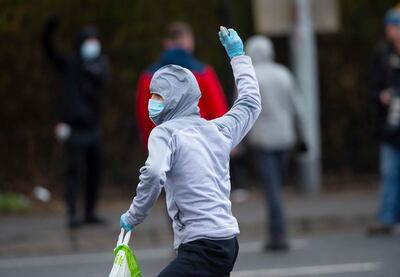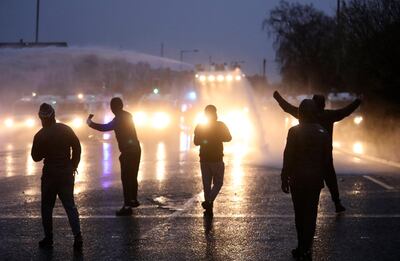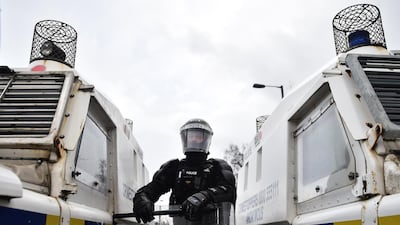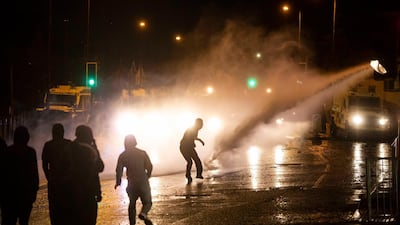Northern Ireland police were hit with a barrage of petrol bombs and rocks on Thursday night as violence flared in Belfast for the seventh night running.
Riot police on the republican side of the divided city were pelted with projectiles as they tried to prevent a crowd advancing towards pro-UK unionists.
A water cannon was used for the first time for six years in the province, in an attempt to disperse the rioters.
"There is no role for violence to resolve these issues," Britain's Transport Secretary Grant Shapps said on Friday. He suggested that parties from all sections of Northern Ireland unite in denouncing the unrest.
"We need to make sure that people are talking – but not through violence," he told Sky News.

Despite similar appeals from Ireland, the United States and the European Union, crowds of hooded youths and young men have taken to the streets nightly, injuring at least 55 police officers and setting fire to a moving bus.
Rioters hurled petrol bombs and fireworks at armoured police vehicles, as well as rocks, bricks and glass bottles.
Violence over the past few days – the city's worst disorder in recent years – broke out within its unionist community, leading to condemnation from political leaders in the British province.
Unionists are angry over the economic dislocation caused by Brexit, and existing tension with pro-republican communities.
"Destruction, violence and the threat of violence are completely unacceptable and unjustifiable, no matter what concerns may exist in communities," said the Northern Ireland executive, made up of unionist, republican and centrist parties.
"While our political positions are very different on many issues, we are all united in our support for law and order."
The UK's Northern Ireland Secretary, Brandon Lewis, visited Belfast to meet leaders from the main parties, including unionist First Minister Arlene Foster and Deputy First Minister Michelle O'Neill of Sinn Fein, as well as faith and community advocates.
Mr Lewis called the joint condemnation "a very clear statement", and said there was "no excuse for violence. We've got to make sure we take things forward in a proper democratic and political way".

In Washington, the White House expressed concerns over the violence and urged calm.
"As the United Kingdom and the EU implement Brexit-related provisions, this administration encourages them to prioritise political and economic stability in Northern Ireland," State Department spokesman Ned Price said.
"President Biden has been unequivocal in his support for the Belfast and Good Friday agreement, which was a historic achievement. We believe that we must protect it and we believe that we must ensure it doesn't become a casualty of Brexit."
In the disorder on Wednesday, gates were set alight on a "peace line" – walls separating pro-Irish nationalist and unionist communities – and police said crowds from either side broke through to attack each other with petrol bombs, missiles and fireworks.
Police Service of Northern Ireland assistant chief constable Jonathan Roberts said the scale and nature of the violence was a rare occurrence.
"The fact that it was sectarian violence and there were large groups on both sides ... again is not something we have seen for a number of years," Mr Roberts said.
Before Thursday, six nights of unrest injured 55 police officers, a press photographer and the driver of the bus fire-bombed on Wednesday, he said.
Mr Roberts said children as young as 13 were suspected of involvement after being encouraged by adults, and the large number of petrol bombs used suggested the violence was planned.
Police are investigating whether Northern Ireland's notorious paramilitary groups were involved.
Northern Ireland endured 30 years of sectarian conflict in which 3,500 people were killed.
Unionist paramilitaries, British security forces and armed nationalists seeking to unite the territory with the Republic of Ireland battled until a landmark peace deal in 1998.
The accord let unionists and nationalists coexist by blurring the status of the region, which dissolved border checks with EU member Ireland.
But Britain's 2016 vote to quit the EU revived the need for border checks.
A special protocol was agreed to, which shifted the controls away from the land border to ports trading with the UK mainland, prompting many unionists to accuse London of betrayal.
There was also recent outrage among unionists after Northern Irish authorities decided not to prosecute Sinn Fein leaders for attending a large funeral last year of a former paramilitary leader, in apparent breach of Covid-19 restrictions.
Few people in central Belfast on Thursday wanted to discuss the sensitive situation.
"It's deep-rooted, it's not just about Brexit," said Fiona McMahon, 56. She said Britain's EU withdrawal had had a "massive impact".
"The British do whatever the hell they want to do and we get landed with everything afterwards," she told AFP.
UK Prime Minister Boris Johnson and Micheal Martin, Ireland's Taoiseach, agreed during a phone call that "the way forward is through dialogue and working with the institutions of the Good Friday Agreement", the government in Dublin said.









